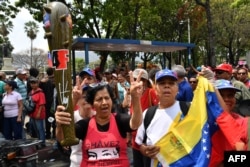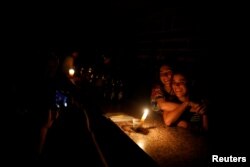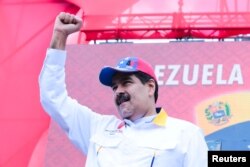Venezuelans held competing protests Saturday, declaring their support for President Nicolas Maduro, aided by Russia and China, or self-declared interim president Juan Guaido, who is backed by the United States and 50 other nations.
Guaido's followers met in Los Teques near Caracas, while Maduro supporters gathered in the center of the capital for what was billed as an "anti-imperialist rally."
The protests came a day after the International Federation of the Red Cross and Red Crescent Societies announced it had obtained permission to distribute humanitarian aid in the economically distressed nation and will begin doing so within 20 days. The permission would mark a change in the Maduro government's policy on outside aid, which has been blocked from entering Venezuela.
Both Maduro and Guaido have sought to make themselves appear to be the nation's savior by taking control of food and medical aid that Venezuelans desperately need. But the Red Cross says it is remaining neutral. Red Cross officials reportedly met with both Maduro and Guaido about aid distribution before making any announcement.
Meanwhile, Venezuelans suffered their latest power blackout Friday night. It took place around 7 p.m. local time and affected 20 of Venezuela's 23 states, according to social media. The cause of the blackout was not clear, but the country has been experiencing power outages for weeks, causing problems with the water supply, transportation and internet services, according to the French news agency AFP.
Guaido's supporters are specifically protesting the blackouts.
On Friday, U.S. President Donald Trump told reporters in Florida that Venezuela was "a big fat mess," on a day when other White House officials hinted that economic sanctions might be on the way.
Trump took questions from reporters on a wide range of subjects Friday afternoon, including on what the United States would do about Venezuela.
"Venezuela is a big fat mess," Trump said. "Electricity's gone, power's gone, gasoline for cars. When you talk about socialism, take a look at Venezuela."
Earlier Friday, the U.S. special envoy for Venezuela, Elliott Abrams, said Secretary of State Mike Pompeo had a list of options, including economic sanctions, for dealing with the presence of Russian troops in Venezuela. Two Russian air force planes landed outside Caracas last Saturday and were believed to be carrying Russian military personnel and equipment.
"I would just say that we have options and that I think it would be a mistake for the Russians to think they have a free hand here," Abrams told reporters at the State Department.
'Ludricous effort'
Asked about Maduro's announcement this week that Guaido had been banned from Venezuelan politics for the next 15 years, Abrams said, "I don't imagine that Juan Guaido is deeply worried, because the Maduro regime — while it might be around in 15 days, [it] is not going to be around in 15 years. So it's a ludicrous effort on the part of the regime to keep Mr. Guaido quiet."
U.S. national security adviser John Bolton spoke to the Reuters news service Friday afternoon, hours after issuing a statement warning other countries not to send military resources to Venezuela.
Questioned about economic sanctions on Venezuela, which the U.S. envoy to Venezuela had mentioned hours earlier, Bolton said, "We're considering what options to follow through on."
"We're not afraid to use the phrase 'Monroe Doctrine' in this administration," Bolton said, referencing a U.S. policy from 1823 that guarded against foreign interference and colonization in the Americas.
He said any sanctions on Venezuela would be designed "to prevent the Maduro regime from being able to finance itself."
On Wednesday, Trump told a reporter several times, "All options are open," in response to a question about whether the United States was willing to put "boots on the ground" to remove the Russians. Trump added that Moscow was aware of the U.S. stance.








